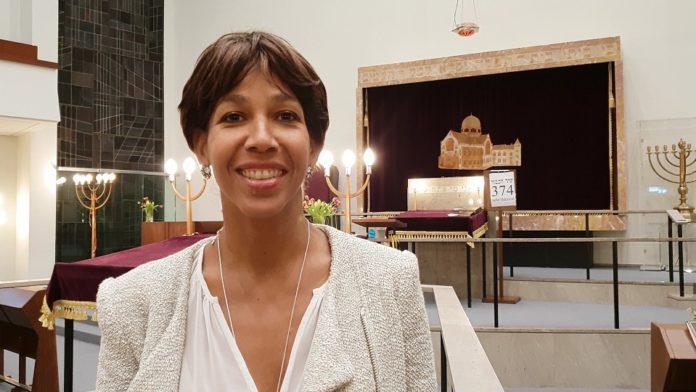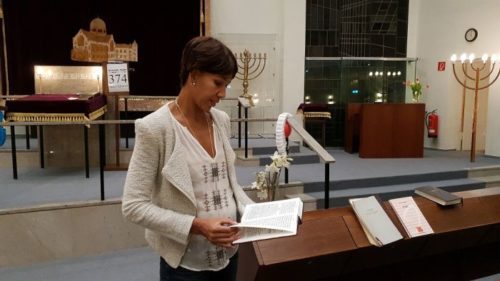

Granddaughter of notorious death camp commander: ‘There is no Nazi gene’
Jennifer Teege’s life was changed by a book. It was not a book she knew or planned to read, but as she was killing time one day at the central library in the city of Hamburg, where she lives, its red cover happen to catch her attention. “I Have to Love My Father, Don’t I?” read its provocative title, and underneath it an explanation: “The Life Story of Monika Goeth, Daughter of the Concentration Camp Commandant from ‘Schindler’s List.’”
Flipping through its pages, Teege (48) noticed that some of the photos looked familiar. “There was a photograph of a woman with long dark hair and she reminded me of my biological mother,” she told i24NEWS. “And there was another picture of an older woman and she reminded me of my biological grandmother. In the end, there was a summary of some biographical details and then I understood that this was not just some random book – it was telling the story of my biological family.”
Teege, whose biological father was Nigerian, grew up in foster care and had little contact with her biological family. She was adopted at the age of seven, and unaware of her family history, spent much of her 20’s in Israel, learning Hebrew and attending university. She was almost 40, married with children, when her life was turned upside down by the chance discovery that her grandfather was sadistic Nazi criminal Amon Goeth, known as “The Butcher of P?aszów”.
“I could not see anything positive about it. I was in shock. I remember standing in front of the mirror in my bathroom, holding a small photograph of Amon Goeth and looking to see if there are any similarities between the two of us – and I did find some. I was so scared that I am like him, which is obviously wrong – you can inherit a trait but not a character. There is no Nazi gene.”
Coming to terms with the truth took months, even years. After seeking therapy, she slowly began sharing her story with friends and family members, eventually writing a book titled “My Grandfather Would Have Shot Me.” The memoir, published in 2013, became an international bestseller.
“I wasn’t planning to be so open about it, I was in hiding for a long time,” she recalls. “But eventually I realized that this is bigger than just a personal story, it has so many elements people can relate to. You should not take such a story to your grave.”
Being half-black adds another layer to the story “insofar that I so do not support the Aryan ideal,” says Teege, but in fact, family secrets of this sort are not so rare in Germany. “So many people belong to that generation, almost in every family there are perpetrators,” he notes.
“In Germany there used to be a wall of silence after the war. People did not talk about it. Nowadays it is different – Holocaust education is mandatory in Germany, so people do talk about it. What they do not do is talk about it within the family. They are afraid of the answers.”
Now Teege uses her personal story to educate others. She travels the world, giving lectures and reading from her book, in the hopes of making a difference. “Very often we get information and we talk about numbers, the millions of people who were killed, but facts don’t enter people’s heart.”
“To change people and to get them to act differently, you need to tell personal stories – which is what survivors did for so many years. They went to school, they told their stories and they really reached people. But unfortunately that generation is going to pass away, so someone else has to sort of take over.”
This task is becoming increasingly important with the rise of right-wing forces all across Europe, which are frequently accused of trivializing Nazi crimes. “I am truly ashamed to have a right wing party in the parliament,” says Teege about the populist Alternative for Germany (AfD).
“They are still a minority but these people do believe that the next generation does not need to know anything about the Holocaust, and obviously they do have to get educated, because if they don’t know, they will make the same mistakes again.”
Asked if she regrets learning the truth about her family, her answer leaves no doubt: “I’m so happy that I know!” she says. “People always ask me, ‘are you different today?’ No, I’m not. But I had to and did integrate this into how I perceive my identity.”
“I have also been back to Israel to meet with survivors, and to see how they react and how they embrace me, is so wonderful,” she remarks. “When I say, I want to turn something negative into something positive, it’s definitely the fact that they, the survivors, can see that history doesn’t necessarily needs to repeat itself in a person.”






